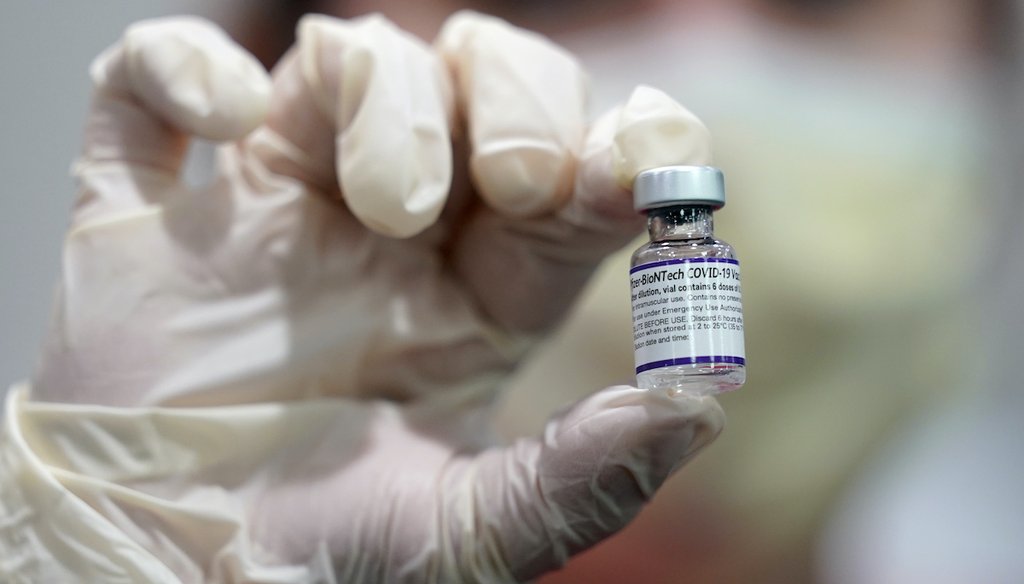Stand up for the facts!
Our only agenda is to publish the truth so you can be an informed participant in democracy.
We need your help.
I would like to contribute

A healthcare worker holds a vial of the Pfizer COVID-19 vaccine at Jackson Memorial Hospital Tuesday, Oct. 5, 2021, in Miami. (AP)
Did a member of a U.S. Food and Drug Administration committee that voted in favor of giving a COVID-19 vaccine to kids say: "We're never gonna learn how safe the vaccine is until we start giving it"?
The answer is: Yes-but.
There was a quote to that effect, as an Instagram post stated. But the quote, by Dr. Eric Rubin, an adjunct professor of immunology and infectious diseases at Harvard University and editor-in-chief of the New England Journal of Medicine, is being shared online without important context.
The post was flagged as part of Facebook’s efforts to combat false news and misinformation on its News Feed. (Read more about our partnership with Facebook.)
Here’s a look at what Rubin said, in context.
The FDA on Oct. 29 extended what is known as emergency use authorization for the Pfizer vaccine so that it can be administered to children ages 5 to 11. Previously, it was available only to people 12 and over.
The decision paves the way for children in that age group to be vaccinated; it does not mandate they be inoculated.
Rubin’s quote came three days earlier, during a meeting of the FDA’s Vaccines and Related Biological Products Advisory Committee, which reviews and evaluates data concerning the safety, effectiveness and use of vaccines. After its discussion, Rubin and other committee members voted 17-0 with one abstention to recommend extending the Pfizer authorization, concluding that its benefits outweigh the risks.
Here’s what Rubin said (5:41:30 of the video):
"This is a much tougher one, I think, than we had expected coming into it. The data show that this vaccine works and it’s pretty safe …. And yet, we’re worried about a side effect that we can’t measure yet, but it’s probably real. And we see a benefit that isn’t the same as it is in older age groups," he said.
The side effect is myocarditis, an inflammation of the muscle of the heart. Studies have shown an increased risk with the Pfizer and Modnera vaccines, particularly male adolescents and young adults, but that cases "have tended to be clinically mild," according to the federal Centers for Disease Control and Prevention.
"So, for me, I think it’s going to revolve around two questions, whether there is going to be a use for this vaccine in this age group, and then how the decision gets made within this age group.
"It’s a very, sort of, personal choice. If I had a child who was a transplant recipient, I would really want to be able to use a vaccine. And there are certainly kids who probably should be vaccinated.
"The question of how broadly to use it, though, I think is a substantial one. And I know it’s not our question, and I know we’re kind of punting that to ACIP (the CDC’s Advisory Committee on Immunization Practices, which meets Nov. 2). But I do think that it’s a relatively close call ... it really is going to be a question of what the prevailing conditions are.
"But we’re never going to learn about how safe this vaccine is unless we start giving it. That’s just the way it goes. That’s how we found out about rare complications of other vaccines like the rotavirus vaccine. And I do think we should vote to approve it."
(The rotavirus, which spreads easily among infants and young children, can cause severe watery diarrhea, vomiting, fever, and abdominal pain. Common side effects are irritability and mild, temporary diarrhea or vomiting, though some studies suggest that rotavirus vaccination possibly causes a type of bowel blockage, which the CDC says is very rare.)
Rubin later told the Washington Post he believes the Pfizer COVID-19 vaccine will benefit children — but not as much as it has helped adults, saying: "So in that situation, we worry more about side effects" because the benefits are not as large. "They are kids. The stakes are high."
Our Sources
Instagram, post, Oct. 27, 2021
Food and Drug Administration, "Vaccines and Related Biological Products Advisory Committee October 26, 2021 Meeting Announcement," Oct. 26, 2021
Food and Drug Administration, "FDA Authorizes Pfizer-BioNTech COVID-19 Vaccine for Emergency Use in Children 5 through 11 Years of Age," Oct. 29, 2021
C-SPAN, "FDA Meeting on COVID Vaccine for Children," (5:41:30) Oct. 26, 2021
Washington Post, "An FDA adviser said we need to give kids vaccines to fully understand their safety. Here’s the crucial context," Oct. 27, 2021
Washington Post, "FDA advisers back Pfizer-BioNTech coronavirus vaccine for children 5 to 11, saying benefits outweigh risks," Oct. 26, 2021
Washington Post, "FDA authorizes Pfizer-BioNTech vaccine for children 5 to 11," Oct. 29, 2021
PolitiFact, "Ask PolitiFact: Children are far less likely to die from COVID-19. Why do they need vaccination?", Oct. 27, 2021
Centers for Disease Control and Prevention, "COVID-19 Vaccine Safety Updates," Oct. 21, 2021


























